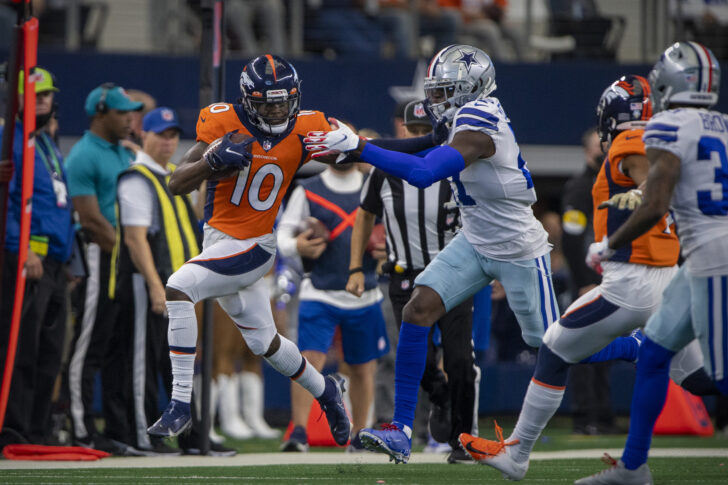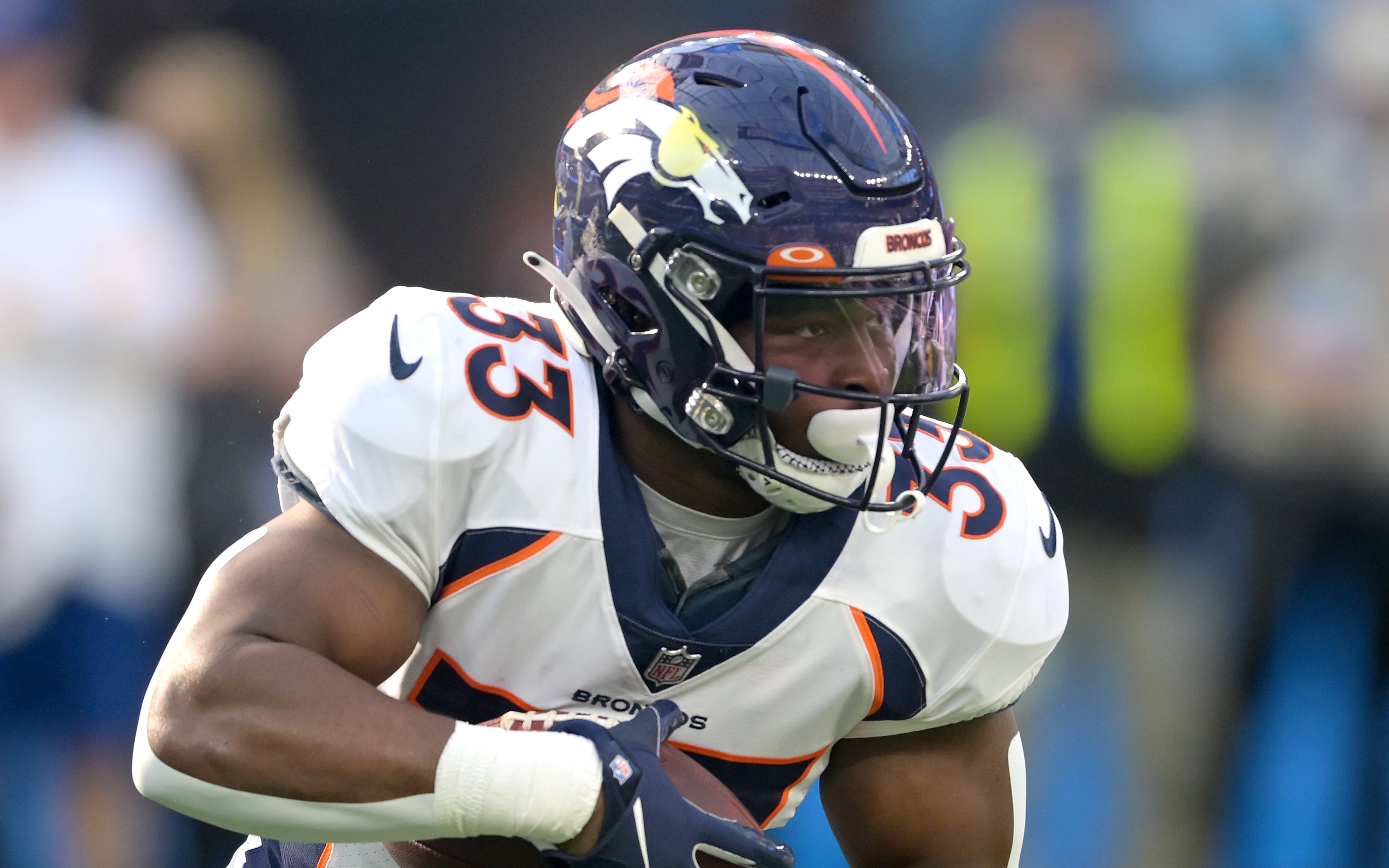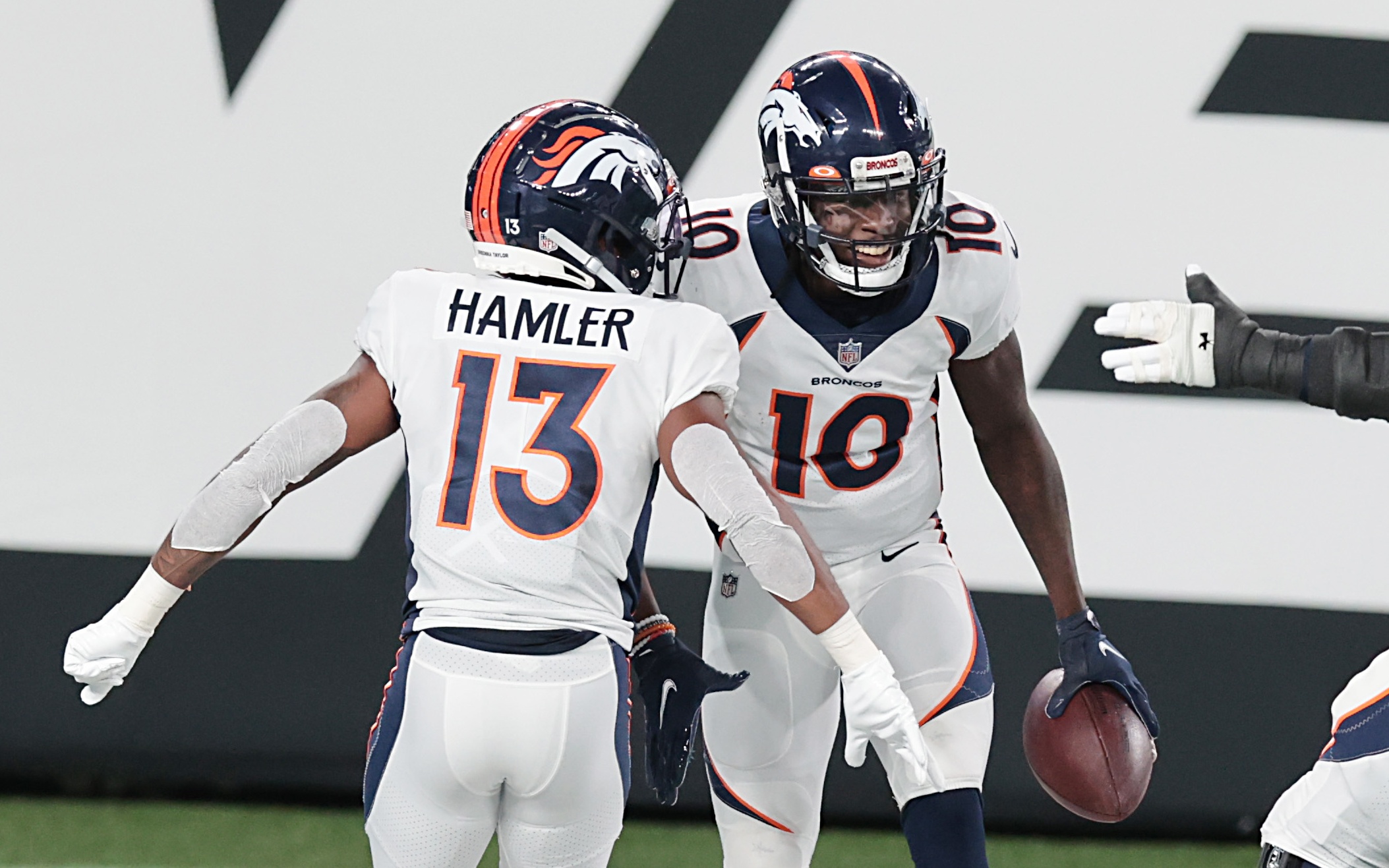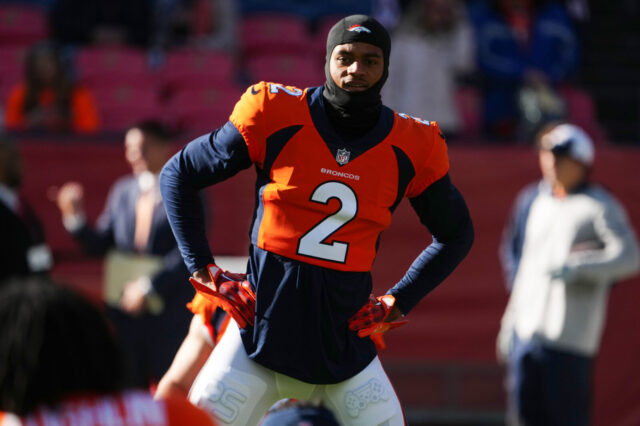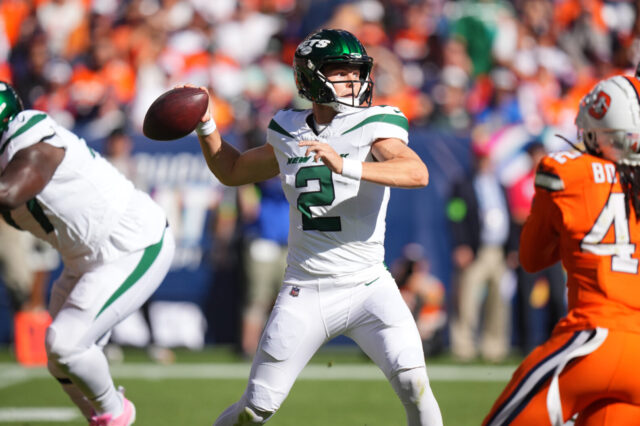As the Denver Broncos enter the 2022 NFL season, the team finds themselves in a more critical position than any Broncos squad since 2015 has been in. For once the season finally means something, and there are stakes on the line.
Will the Broncos miss out on the playoffs altogether in the most talent-rich division in the most talent-rich conference in the NFL? Or, will they emerge as legitimate Super Bowl contenders?
Here are five Denver Broncos on both offense and special teams (excluding the quarterbacks) who will be the biggest X-factors for the franchise in 2022.
5. Albert Okwuegbunam
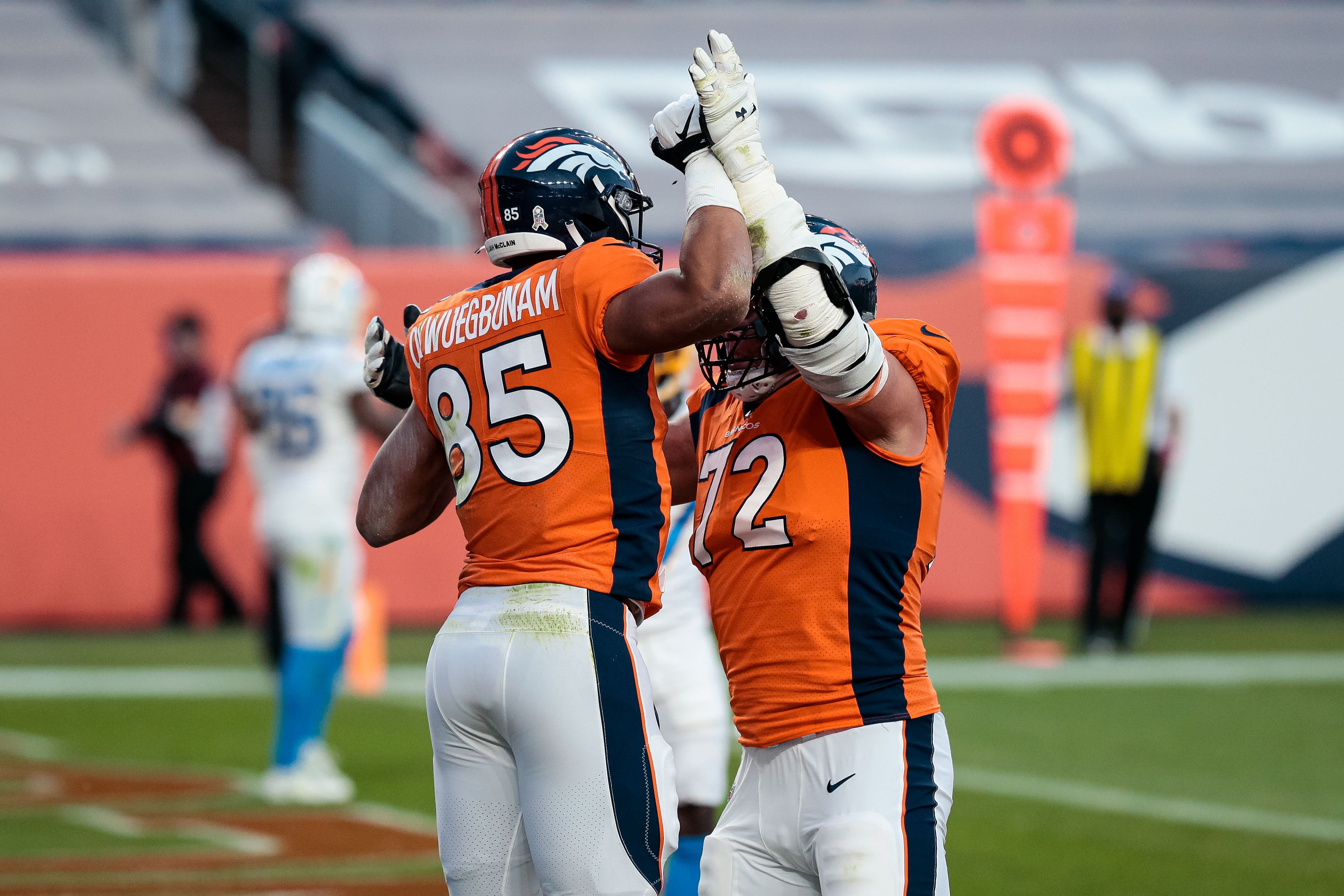
Nov 1, 2020; Denver, Colorado, USA; Denver Broncos tight end Albert Okwuegbunam (85) celebrates his touchdown with offensive tackle Garett Bolles (72) in the fourth quarter against the Los Angeles Chargers at Empower Field at Mile High. Mandatory Credit: Isaiah J. Downing-USA TODAY Sports
For the Broncos to properly operate their offense, they’re going to need a lot more out of Albert Okwuegbunam, especially considering that Noah Fant is now out of the fold and the No. 2 tight end is an undersized rookie.
Okwuegbunam won’t have to improve much as a receiver, as he’s already pretty dangerous there, and was even better than Fant for much of last season. Okwuegbunam’s receiving talents minimize the pressure placed on his pass-catching, as does Russell Wilson’s hesitance to heavily utilize his tight ends in the passing game. There’s no doubt he’ll be good enough there.
However, Okwuegbunam will have to make sizable leaps as a blocker, as Hackett’s offense expects quite a bit out of its tight ends from a blocking perspective. To be frank, the blocking ability Okwuegbunam has showcased through his first two seasons, simply won’t be good enough, and could lead to the third-year tight end disappointing if he can’t show progress.
#FFIDP Davion Taylor breaks off the block from Albert Okwuegbunam and wraps up Melvin Gordon – forcing the fumble that Darius Slay recovered for the TD… pic.twitter.com/lquOE1Hiwo
— Mike Woellert (@Mike_Woellert) November 15, 2021
If he fails to improve, his presence on the offense could serve as a tell or a liability, forcing Denver’s hand to turn to a less-talented yet more well-rounded option, like Eric Saubert.
If the Broncos want to maximize their rushing attack, and therefore their offense, a lot of pressure will fall on Okwuegbunam as a blocker, and how he responds to that pressure will have heavy implications for the rest of Denver’s season.
4. Dwayne Stukes
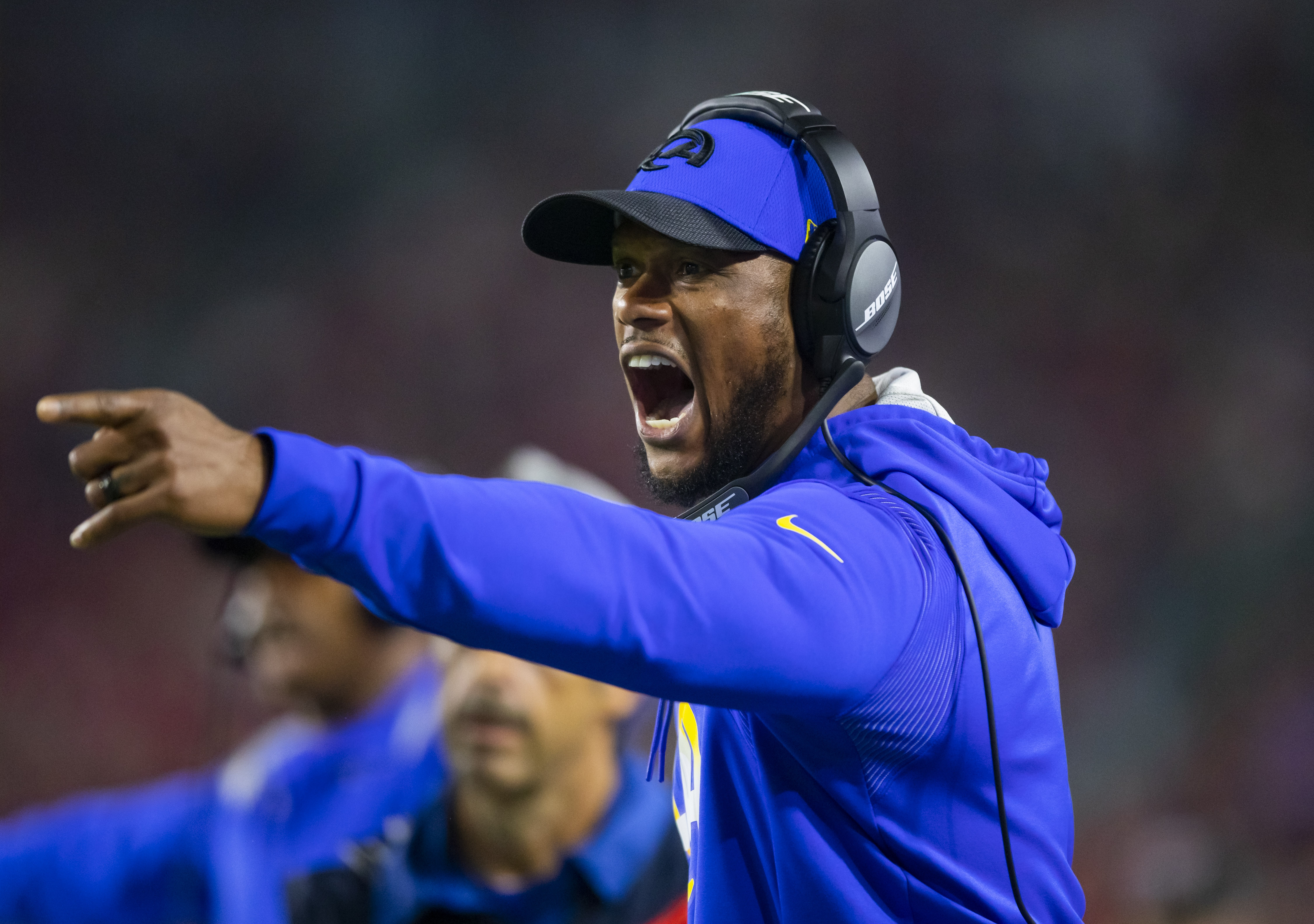
Dec 13, 2021; Glendale, Arizona, USA; Los Angeles Rams assistant special teams coach Dwayne Stukes against the Arizona Cardinals at State Farm Stadium. Mandatory Credit: Mark J. Rebilas-USA TODAY Sports
It’s no secret that the Broncos’ special teams unit has struggled mightily each of the past several seasons. Not only that, but it seems any personnel upgrades Denver makes to improve the special teams are ultimately fruitless, as the unit continues to bottom-feed.
Now, they’re finally trying a change in coordinators to find the solution. If Dwayne Stukes, in his first season as a special teams coordinator, can be the answer to Denver’s problem in the sport’s third phase, the effects could be massive.
The Broncos are used to playing with one hand tied behind their back as a result of special teams blunders. If Denver’s special teams can be a non-factor, or even be an asset to the team, it will remove a solid hurdle from the team’s path to the Super Bowl, and that all comes down to Stukes.
3. Calvin Anderson
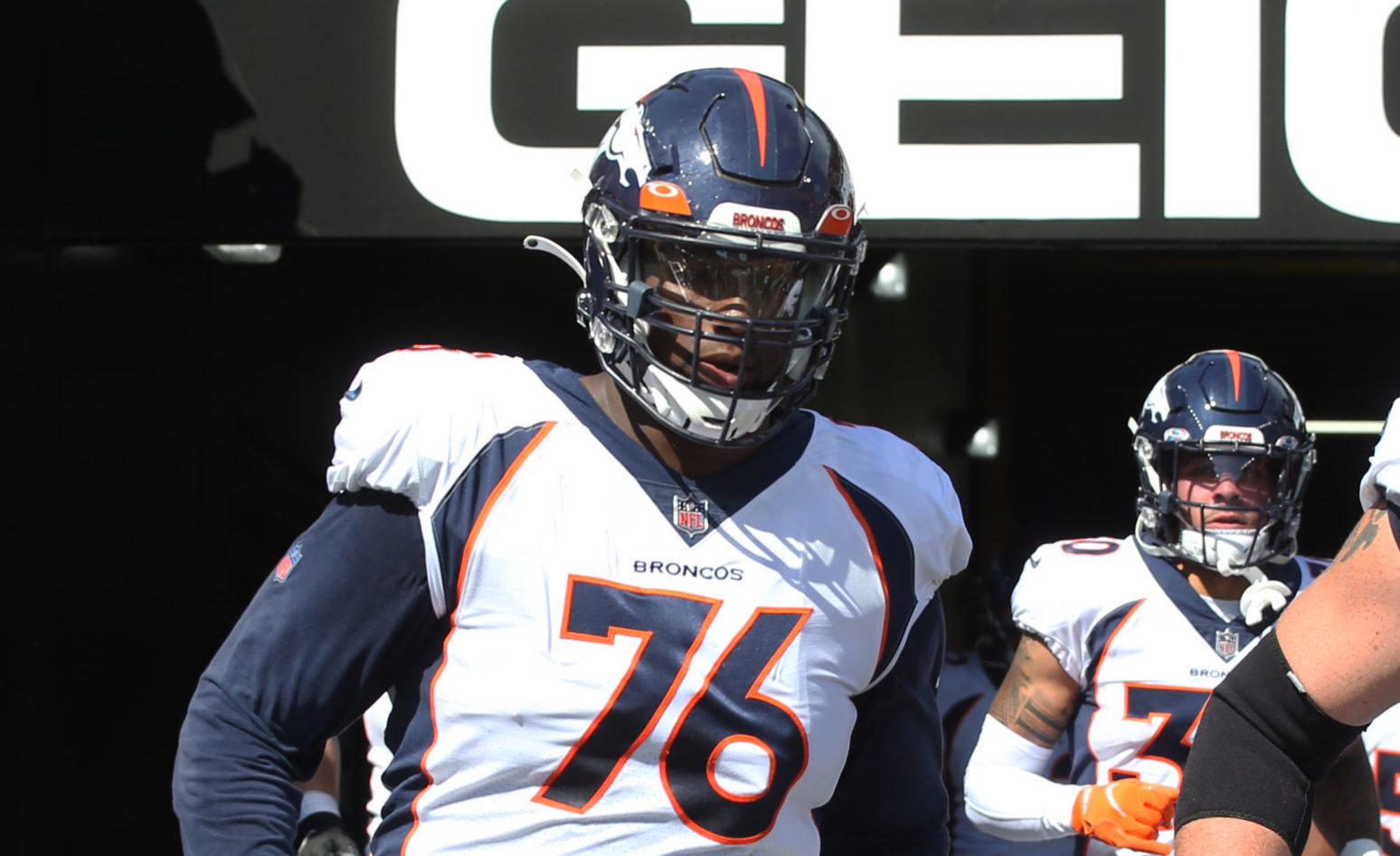
Oct 10, 2021; Pittsburgh, Pennsylvania, USA; Denver Broncos offensive tackle Calvin Anderson (76) and guard Quinn Meinerz (77) take the field to play the Pittsburgh Steelers at Heinz Field. The Steelers won 27-19. Mandatory Credit: Charles LeClaire-USA TODAY Sports
The Broncos’ offensive line is presently a complete enigma, as only Garett Bolles and Quinn Meinerz are solidified in their starting roles, and there are question marks hovering around the other three starting spots. If Calvin Anderson can impress and win the starting right tackle job, it will clear up many of those looming concerns.
Anderson will have an uphill battle towards winning the job, but if he can beat out Billy Turner, it will allow Turner to play guard — where he is at his best.
That also helps solve the Dalton Risner/Lloyd Cushenberry problem, as it allows Turner and Meinerz to form an excellent guard tandem — lessening the need for the underperforming Risner, who’s been among Denver’s worst starting linemen since 2020 — and it allows Glasgow to take over for Cushenberry at center, upgrading one of the team’s major weak points.
If it plays out that way, you’ll have all five spots along the line filled with competent talents, and there aren’t many lines that can say that. Assuming Anderson truly outplays Turner and wins the starting job that way, Denver’s offensive line could quickly flip from being a weakness to a strength, relative to the offensive line units around the league.
2. Javonte Williams
We all know Javonte Williams is good, but just how good can he be?
If he can become the elite, top-five running back he showed flashes of throughout last season, it will transform Denver’s offense and make it considerably more likely we get the elite version of Wilson, rather than the up-and-down iteration of the last two seasons.
Even though he’s a future Hall-of-Fame quarterback, Wilson still has his shortcomings. He struggles to attack the short-to-intermediate part of the field, between the hashes. As a result, opposing defenses want to sit back and play more conservative coverages that take away Wilson’s legendary deep ball.
Over the past two seasons in Seattle, defenses were able to play that way, and somewhat stifle Wilson, because the Seahawks didn’t have the rushing attack to punish teams for sitting back on their heels. Fortunately, the Broncos and Williams should offer the type of rushing attack that can punish teams for only playing the pass.
9️⃣ years ago today, the BeastQuake shook our city. 🗣
— Seattle Seahawks (@Seahawks) January 8, 2020
We saw what Marshawn Lynch did for Wilson, and few backs since Lynch’s prime have been more reminiscent of the former Seahawks great than Williams, whose bruising running style closely mimics that of the skittles-loving running back.
You better bring a big squad if you wanna try and bring down Javonte Williams@javontewill33 | @Broncos
via @nfl pic.twitter.com/QYAfe3N0Jm
— NFL on CBS 🏈 (@NFLonCBS) July 6, 2022
Despite showing those flashes of elite play, Williams’ biggest flaw is his subpar vision, which should make the transition to Hackett’s wide zone scheme interesting. Generally speaking, the wide zone scheme has helped running backs find more success, but it does place an emphasis on the back’s vision.
I don't know who needs to see this, but no the Broncos should not dial up more outside zone for Javonte Williams.
Given his issues with vision, that's probably the last thing they should do. pic.twitter.com/KKl99nJqOz
— Joe Rowles (@JoRo_NFL) October 13, 2021
Williams’ vision improved over the course of last season, but it’s something he’s going to have to continue to develop that trait in order to become an All-Pro caliber back within Hackett’s scheme. It’s a developmental step that’s well within reason, considering the progress we’ve already seen, but it’s also not a given that he’ll take that step.
If Williams is a dominant back, it will make Denver home to one of the most balanced and explosive attacks in the entire NFL, which could raise them to true contender status.
1. Jerry Jeudy, K.J. Hamler & Courtland Sutton
The Denver Broncos receiving corps has been hyped up for years as one of the more talented units in the league, and rightfully so.
Courtland Sutton and Jerry Jeudy were both widely viewed as the best receivers in classes that have since produced either Pro Bowl or All-Pro receivers; K.J. Hamler has movement skills few human beings can match; Tim Patrick is one of the best undrafted players in the league.
The one problem is, outside of Patrick, the production hasn’t matched the talent.
Now, to some extent, that’s understandable. Few positions in the sport — if any — rely on the performance of others more than wide receiver, who needs both the quarterback, offensive line and the offensive play-caller to all do a quality job in order to succeed.
Considering what Denver’s quarterbacks, offensive line, and offensive play-callers have looked like over the past few seasons, that’s understandable.
That said, it’s not impossible to produce in a non-ideal situation, which means both Jeudy, Sutton and Hamler still have a lot to prove, and no more excuses to hang their hats on with Nathaniel Hackett and Russell Wilson now on the team.
Jeudy and Hamler have to prove they can be the receivers Denver was promised when they were selected. For Hamler, that will come down to remaining healthy, as his play style perfectly fits Wilson’s strengths. If healthy, he should have a breakout season and operate as a high-end field-stretcher that opens opportunities underneath.
Broncos' KJ Hamler TORCHES Cameron Dantzler (and the entire Vikings secondary) for an 80-yard TD. pic.twitter.com/S8N5mPqhfD
— Austin Gayle (@austingayle_) August 14, 2021
For Jeudy, that will come down to finding a way to fit with Wilson, despite their strengths not necessarily aligning. The two players are talented enough to piece it together, but it will require adaption on either Wilson’s end, Jeudy’s end, or from both of them.
With Sutton, we’ve actually seen the high-end play. Now, the question is just, can he return to form now that he’s more removed from the ACL injury that robbed him of his 2020 campaign, and limited him in 2021.
If those three pass-catchers can realize their high-end potential, the Denver Broncos will impose sleepless nights and headaches onto the defensive coordinators they’ll face. If those players struggle to reach expectations, Denver’s offense is almost sure to disappoint.
